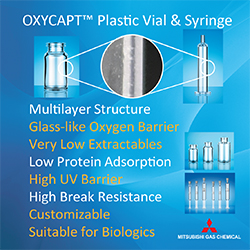Ovid Therapeutics Announces Collaboration With Graviton Bioscience, Proven Developers of Selective ROCK2 Inhibitors
Ovid Therapeutics Inc. and Graviton Bioscience Corporation recently announced a collaboration agreement to innovate novel medicines they believe will significantly change the treatment paradigm for serious, rare neurological diseases.
The agreement supports Ovid’s strategy of building a pipeline of first-in-class and best-in-class mechanisms for seizure-related disorders. Specifically, the collaboration will advance clinical development of GV101, which is currently in a Phase 1 trial, along with other selective, small-molecule compounds from a library of ROCK2 inhibitors that have shown blood-brain barrier penetrance in animals. Together, the companies intend to develop ROCK2 inhibitors for the treatment of a broad range of neurological conditions marked by seizures, spasms and related symptoms. Initial clinical development is anticipated to address cavernous malformations in the brain, for which there is strong mechanistic evidence for inhibiting ROCK2. The collaborators intend to harness the expertise held by the team at Graviton, who previously pioneered the development of Rezurock, the first approved ROCK2 inhibitor for graft vs. host disease, and Ovid’s development capabilities in rare brain conditions.
“This collaboration complements our pipeline with clinical and preclinical programs and represents an important step in achieving our strategy,” said Dr. Jeremy Levin, DPhil, MB BChir, Chairman and CEO of Ovid Therapeutics. “We are excited to begin work with a combined team that is deeply experienced at identifying and accelerating new therapeutic technologies for unaddressed diseases. ROCK2 inhibition is a completely novel mechanism of action for the brain, which we believe will open new therapeutic avenues and change the fate of patients.”
“Our ROCK2 inhibitor compounds have shown to be extraordinarily selective and potent in many preclinical studies, and as a result, we believe they may provide significant therapeutic benefit for a broad range of diseases, including neurologic, immunologic, fibrotic and genetic conditions,” added Samuel Waksal, PhD, and founder of Graviton. “Working alongside Ovid and a series of partners, we seek to accelerate our candidates into the clinic to rapidly elucidate the therapeutic potential of this portfolio. We believe and hope that ROCK2 inhibition will become a future mainstay in the treatment of people with severe brain conditions who have no medicines today.”
Under the terms of the agreement, Ovid will make an upfront payment of $10 million in exchange for Series A preferred stock of Graviton, subject to certain closing conditions. Ovid will have rights to develop GV101 as well as a portfolio of ROCK2 inhibitors owned or developed by Graviton in mutually agreed upon rare central nervous system indications worldwide, excluding China, Hong Kong, Macau and Taiwan. Additionally, Ovid CEO Dr. Jeremy Levin will serve on Graviton’s Board of Directors.
Graviton will be responsible for conducting the development of the products through the end of Phase 2 trials under the oversight of a joint development committee from both companies. Ovid will be responsible for: development and commercialization costs, post-Phase 2 development and commercialization of the products. Graviton will be eligible for percentage royalties in the mid- to high-teens based on net sales in territories where the products are marketed. Graviton retains rights to licensed products in all fields of study outside of rare brain disorders.
ROCK2 is a central phosphorylating kinase with isoform differences in tissue distribution. Specifically, the ROCK2/RhoA axis is expressed abundantly in skeletal muscles and in the brain. Published evidence suggests that the ROCK2 signaling pathway may be uniquely activated in multiple diseases, including conditions involving endothelial and autoimmune disorders. Ovid and Graviton have particular interest in neurological disorders involving vascular structures and nerve myelination diseases that can result in seizures, spasms and a variety of symptoms. Despite this link, historically there has been limited clinical development of ROCK2 inhibitors due to challenges penetrating the blood-brain barrier. Ovid and Graviton believe they have multiple selective and potent ROCK2 inhibitors that effectively penetrate the blood-brain barrier, which will be appropriate in future development indications.
Ovid Therapeutics Inc. is a New York-based biopharmaceutical company striving to conquer seizures and brain disorders with courageous science. Ovid’s pipeline of small molecule and genetic medicines candidates seek to meaningfully improve the lives of people and families affected by epilepsies. Ovid is developing OV329, a GABA-aminotransferase inhibitor, for treatment-resistant seizures and OV350, a direct activator of the KCC2 transporter, for potential treatment of epilepsies. In addition, Ovid maintains a significant financial interest in the future regulatory development and potential commercialization of soticlestat, which Takeda is responsible for advancing globally. Soticlestat is a cholesterol 24-hydroxylase inhibitor, which is currently in Phase 3 trials for Dravet and Lennox-Gastaut syndromes. For more information, visit www.ovidrx.com.
Graviton Bioscience Corporation is a New York-based company founded in 2020 with the goal of developing novel therapeutics for the treatment of autoimmune, cancer, certain genetic, fibrotic and other serious diseases. Leading the company is Dr. Samuel Waksal, the founder and former Chairman and CEO of Kadmon Pharmaceuticals (NASDAQ: KDMN), where he led the licensing and early development of what is the first approved ROCK2 inhibitor, REZUROCK (belumosudil). Kadmon was subsequently acquired by Sanofi. Dr. Waksal is also the founder and former CEO and President of ImClone Systems (acquired by Eli Lilly), a founder of MeiraGTx (NASDAQ: MGTX) and is the founder of Equilibre Biopharmaceuticals Corp.
GV101 appears, in preclinical studies, to be a potentially highly selective, potent inhibitor of Rho/Rho-associated coiled-coil containing protein kinase 2 (ROCK2) that may penetrate the blood-brain barrier. In preclinical studies, GV101 has demonstrated favorable safety and toxicology results compared to other ROCK2 selective inhibitors. It has completed a Phase 1, placebo-controlled, randomized, double-blind, single ascending dose study in healthy volunteers in the US and has completed dosing for a Phase 1 study in China.
Total Page Views: 502













